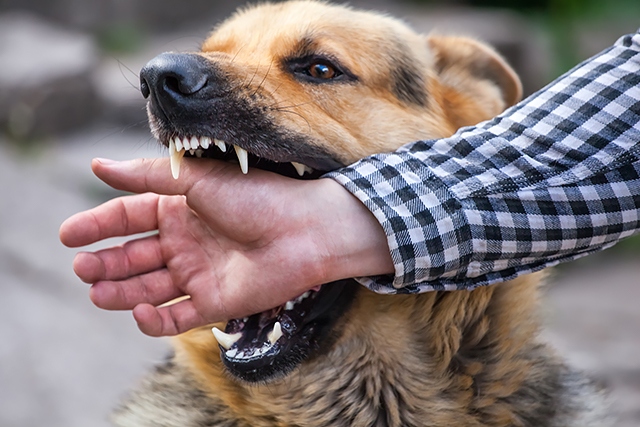Anxious personality may be linked to heightened dog bite risk
Date published: 02 February 2018

Photo: (Stock Image)
Dog biting
Personality type may be linked to a heightened risk of being bitten by a dog, with people of a more anxious disposition more likely to be bitten, suggests research published online in the Journal of Epidemiology and Community Health.
The actual number of dog bites may be nearly three times higher than hospital records indicate, the findings show.
There are 8.5 million dogs in the UK and more than 6,500 people require hospital treatment for dog bite injuries every year in England, though hospital records do not differentiate between bites and other injuries inflicted by a dog.
To try and obtain more accurate and up to date figures, the researchers surveyed 694 people in 385 households in a semi-rural town in one region of northern England (Cheshire West).
They wanted to know how many people had been bitten by a dog; whether the bites needed treatment; and whether the victims knew the dog that had bitten them.
Participants were additionally asked whether they owned a dog themselves.
The researchers also assessed emotional stability using the Ten Item Personality Inventory (TIPI), which measures aspects of personality, including emotional stability and neuroticism, to see whether certain traits might have any bearing on the risk of being bitten.
One in four respondents said they had been bitten before, with men almost twice as likely to have been bitten as women.
People who owned several dogs were more than three times as likely to have been bitten as those who didn’t own dogs, and more than half (just under 55%) of respondents said they had been bitten by a dog they didn’t know.
Hospital records show the rate of dog bites is 740 per 100,000 of the population, but the survey responses indicate a rate of 1873 per 100,000 - nearly three times the official figure.
One in three (33%) dog bites required treatment, but only a small proportion (0.6%) required hospital treatment. While this is reassuring, even minor bites can cause significant emotional distress, the researchers point out.
There also seemed to be a link between personality traits and the risk of being bitten.The TIPI scores showed that the more emotionally stable and less neurotic an individual was, the lower was their risk of being bitten by a dog.
Every single point increase in score between one and seven was associated with a 23% decrease in the likelihood of having been bitten.
This is an observational study so no firm conclusions can be drawn about cause and effect, added to which only households in one county in England were included in the study, so the findings may not be applicable to the rest of the UK, say the researchers. Nor did they consider potentially influential factors such as sex, age, and breed of the biting dog.
They emphasise: “It is essential that previously assumed risk factors are reassessed as this study has revealed that prior beliefs, such as bites typically being from familiar dogs, are contested.”
In light of their findings, they go on to suggest: “Dog bite prevention schemes may also need to target particular behaviours around dogs by different victim personality types.”
Do you have a story for us?
Let us know by emailing news@rochdaleonline.co.uk
All contact will be treated in confidence.
Most Viewed News Stories
To contact the Rochdale Online news desk, email news@rochdaleonline.co.uk or visit our news submission page.
To get the latest news on your desktop or mobile, follow Rochdale Online on Twitter and Facebook.

